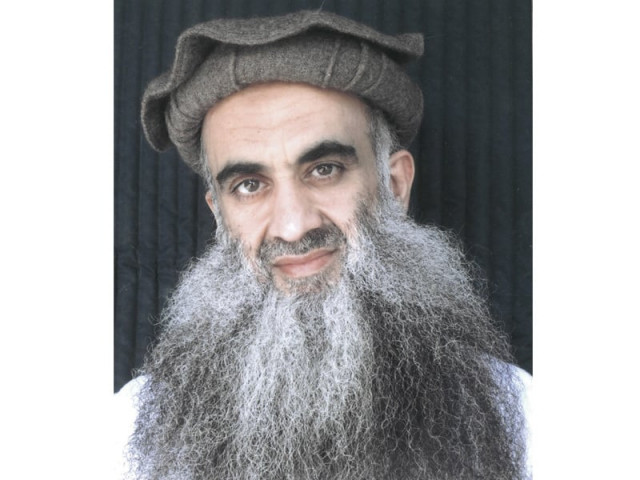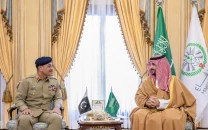9/11 case: ‘His faith has kept him strong’
The family of Khalid Shaikh Mohammad believes he is innocent.

“He was tortured into ‘confessing’,” says Hussain Baloch about his nephew, Khalid Shaikh Mohammad. “He is not this type of person. He didn’t do it.”
Mohammad is the alleged plotter of the 9/11 attacks, who was captured in Rawalpindi in 2003 and transferred to the US. He has confessed to planning and supporting terrorist plots, working for al Qaeda and executing Wall Street Journal reporter Daniel Pearl.
On April 4, US Attorney-General Eric Holder announced that Mohammad and co-conspirators in the 9/11 attacks case would be tried by a military commission despite the Obama administration’s efforts to try them in a federal court. The efforts were blocked by restrictions placed by Congress to bring detainees to trial in the US.
Mohammad was waterboarded 183 times during interrogation but, according to his uncle, “His faith has kept him strong.” His voice is tinged with pride as he recalls Mohammad’s religious leanings and education and how he is mentally and physically fine despite the “torture”.
According to Baloch, Mohammad, who relatives refer to as Abu Hamza, is a “kind, caring person”. Mohammad’s letters are full of questions about his children, relatives and family weddings. In one letter, he asks for news of his family, not of the “mujahideen”.
“Our family wishes him well,” Baloch told The Express Tribune. “They believe he has been wronged.”
Questions about Mohammad’s role in al Qaeda are met with vague replies about Afghanistan and the Soviet invasion. “He was set up. They left Osama bin Laden alive to scare the world into believing there was some danger around. The US used Mohammad and then left the region.”
Baloch says he is unaware of Mohammad’s role in Pearl’s murder and believes 9/11 was a staged conspiracy.
Mohammad’s life is encapsulated in a file maintained by the family, which contains copies of his parents’ Pakistani passports, letters from his university, a New Yorker magazine profile and proof of his Pakistani identity – a ‘B’ form.
In the past eight years, Mohammad’s family has become a fixture in the news. Nephew Ali Abdul Aziz Ali – known as Ammar al Balochi – is being held at Guantanamo and will face trial with Mohammad and three other co-conspirators. Mohammad’s other prominent nephew – Ramzi Yousaf, who masterminded the 1993 World Trade Centre attack – is imprisoned in the US. Ali’s wife, Aafia Siddiqui, was convicted last year of attempting to kill US officials.
Moreover, Mohammad’s nephew and cousin are on the missing persons list. The family alleges they were picked up for their involvement in Baloch nationalist protests. Two of Mohammad’s sons were held by intelligence agencies after his capture. Mohammad told a military tribunal: “They arrested my kids intentionally. They are kids. They (had) been arrested for four months (and) they had been abused.”
Ali’s mother Maryam Aziz filed a case in 2005 in the Sindh High Court challenging the detention of her family members in the US, including Mohammad and Ali. According to the petitioner’s lawyer Ghulam Qadir Jatoi, the case’s last hearing was a month ago. The family members’ documents have been submitted to the authorities for verification that they are Pakistani nationals.
According to relatives, Mohammad’s wife and children are living in near poverty in Iran’s Sistan-Baluchistan province, where his family is from. A relative who visited them recently remarked: “The state of their lives is beyond imagination.” Mohammad’s wife works as a seamstress to make ends meet. His brother drives a cab. The Iranian government has reportedly placed restrictions on the family. Baloch says the family is scared of visiting Pakistan and has not received any financial assistance from Mohammad’s ‘companions’.
Mohammad recently instructed his brother to arrange for his eldest daughter, who is now 22, to be married. His wife was expecting their eighth child when he was captured.
The family communicates with Mohammad and Ali through letters sent via the International Committee of the Red Cross (ICRC) every two to three months. The family also sends them clothes through the ICRC. “Mohammad asked for mithai but the ICRC said it would spoil. We sent him a dried fruit mix. He wanted to share it with other inmates but according to the rules, food has to be eaten in the presence of the ICRC representative.”
Mohammad could face the death penalty if convicted, but his uncle does not believe he will be executed. “This trial will not be open or fair. I do not think they will execute him, they will keep him alive in jail.”
Published in The Express Tribune, April 18th, 2011.



















COMMENTS
Comments are moderated and generally will be posted if they are on-topic and not abusive.
For more information, please see our Comments FAQ